语法复习十六:代词 16开
代词归纳总结
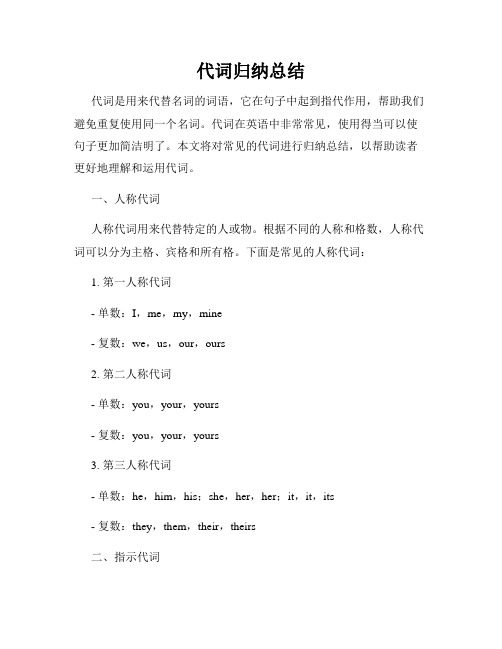
代词归纳总结代词是用来代替名词的词语,它在句子中起到指代作用,帮助我们避免重复使用同一个名词。
代词在英语中非常常见,使用得当可以使句子更加简洁明了。
本文将对常见的代词进行归纳总结,以帮助读者更好地理解和运用代词。
一、人称代词人称代词用来代替特定的人或物。
根据不同的人称和格数,人称代词可以分为主格、宾格和所有格。
下面是常见的人称代词:1. 第一人称代词- 单数:I,me,my,mine- 复数:we,us,our,ours2. 第二人称代词- 单数:you,your,yours- 复数:you,your,yours3. 第三人称代词- 单数:he,him,his;she,her,her;it,it,its- 复数:they,them,their,theirs二、指示代词指示代词用于指代特定的人或物,可以根据距离远近分为近指和远指。
下面是常见的指示代词:1. 近指代词- 单数:this,this,this- 复数:these,these,these2. 远指代词- 单数:that,that,that- 复数:those,those,those三、反身代词反身代词用来指代动作的承受者就是动作的执行者本身。
下面是常见的反身代词:- 单数:myself,yourself,himself,herself,itself- 复数:ourselves,yourselves,themselves四、不定代词不定代词用来泛指一类人或物,或者代替特定的人或物。
下面是常见的不定代词:- all,another,any,anybody,anyone,anything,each,everybody,everyone,everything,few,many,nobody,none,no one,nothing,some,somebody,someone,something,several,many,much,more,most,either,neither,enough五、相互代词相互代词用来表示交互的动作,常见的相互代词有:- each other,one another六、连接代词连接代词既可以引导从句,又可以代替名词,常见的连接代词有:- who,whose,whom,which,that七、物主代词物主代词用于表示所有权,常见的物主代词有:- mine,yours,his,hers,ours,theirs综上所述,代词在英语中起到了简化句子结构和提高表达效果的作用。
代词的语法知识点总结
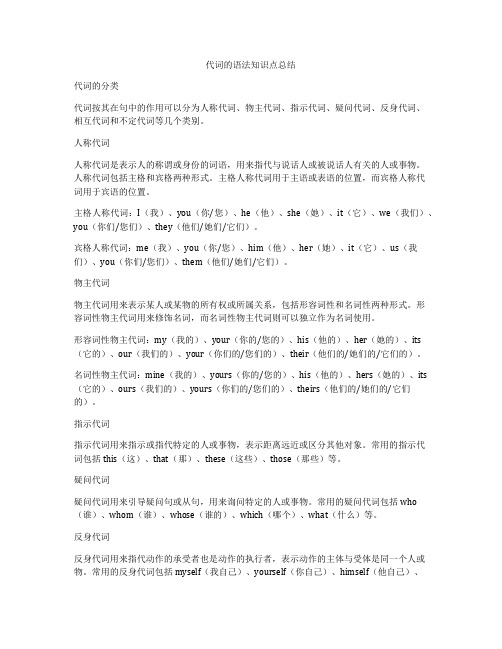
代词的语法知识点总结代词的分类代词按其在句中的作用可以分为人称代词、物主代词、指示代词、疑问代词、反身代词、相互代词和不定代词等几个类别。
人称代词人称代词是表示人的称谓或身份的词语,用来指代与说话人或被说话人有关的人或事物。
人称代词包括主格和宾格两种形式。
主格人称代词用于主语或表语的位置,而宾格人称代词用于宾语的位置。
主格人称代词:I(我)、you(你/您)、he(他)、she(她)、it(它)、we(我们)、you(你们/您们)、they(他们/她们/它们)。
宾格人称代词:me(我)、you(你/您)、him(他)、her(她)、it(它)、us(我们)、you(你们/您们)、them(他们/她们/它们)。
物主代词物主代词用来表示某人或某物的所有权或所属关系,包括形容词性和名词性两种形式。
形容词性物主代词用来修饰名词,而名词性物主代词则可以独立作为名词使用。
形容词性物主代词:my(我的)、your(你的/您的)、his(他的)、her(她的)、its (它的)、our(我们的)、your(你们的/您们的)、their(他们的/她们的/它们的)。
名词性物主代词:mine(我的)、yours(你的/您的)、his(他的)、hers(她的)、its (它的)、ours(我们的)、yours(你们的/您们的)、theirs(他们的/她们的/它们的)。
指示代词指示代词用来指示或指代特定的人或事物,表示距离远近或区分其他对象。
常用的指示代词包括this(这)、that(那)、these(这些)、those(那些)等。
疑问代词疑问代词用来引导疑问句或从句,用来询问特定的人或事物。
常用的疑问代词包括who (谁)、whom(谁)、whose(谁的)、which(哪个)、what(什么)等。
反身代词反身代词用来指代动作的承受者也是动作的执行者,表示动作的主体与受体是同一个人或物。
常用的反身代词包括myself(我自己)、yourself(你自己)、himself(他自己)、herself(她自己)、itself(它自己)、ourselves(我们自己)、yourselves(你们自己)、themselves(他们自己/她们自己/它们自己)。
初中代词知识点总结

初中代词知识点总结代词是一种用来代替名词或其他代词的词语,它们可以用来替代特定的人、事物或概念,以避免重复使用同一个名词。
代词在句子中承担着重要的作用,是英语语法中不可或缺的部分。
在初中阶段,学生需要掌握代词的用法和种类,并能够正确地运用代词来表达自己的意思。
本文将对初中代词的知识点进行总结和归纳,以帮助学生更好地掌握代词的用法和规则。
一、代词的分类1. 人称代词人称代词用来表示说话的人、听话的人或被谈论的人。
根据不同的语境和所处的位置,人称代词分为主格和宾格两种形式。
主格用在主语的位置,而宾格用在宾语的位置。
人称代词的主格和宾格形式如下:主格:I, you, he, she, it, we, they宾格:me, you, him, her, it, us, them人称代词还可根据单数或复数、第一、第二或第三人称的不同进行进一步分类:单数第一人称:I, me单数第二人称:you单数第三人称:he, him, she, her复数第一人称:we, us复数第二人称:you复数第三人称:they, them2. 物主代词物主代词用来表示所属关系,表示某人或某物的所有权或归属关系。
物主代词分为形容词性物主代词和名词性物主代词两种形式:形容词性物主代词:my, your, his, her, its, our, their名词性物主代词:mine, yours, his, hers, its, ours, theirs形容词性物主代词用在名词前作修饰成分,而名词性物主代词则可以独立成句。
3. 反身代词反身代词用于强调句子主语或宾语的身份,指代由动词的行为主体或动作对象自己。
反身代词的形式如下:单数:myself, yourself, himself, herself, itself复数:ourselves, yourselves, themselves4. 指示代词指示代词用来指示特定的人或事物,分为近指示代词和远指示代词。
代词知识点总结简单版

代词知识点总结简单版一、代词的分类1. 人称代词人称代词用来代替表示人或物的名词,分为主格、宾格、所有格和反身代词。
主格人称代词作为主语,宾格人称代词作为宾语,所有格人称代词表示所有关系,反身代词表示主语和宾语在同一个人上。
2. 物主代词物主代词用来表示所属关系,有形式和主体两种形式。
形式物主代词在句中作定语,主体物主代词在句中作宾语或表语。
3. 反身代词反身代词表示动作的主体同时也是动作的宾语,常用来表示主语对宾语的动作是自己。
4. 指示代词指示代词用来指示表示人或物的名词,分为远指代词和近指代词。
5. 疑问代词疑问代词用于提问句,询问人或物的种类、性质、数量或程度。
6. 关系代词关系代词引导定语从句,与先行词相互关联,并在从句中作主语、宾语、表语等成分。
7. 不定代词不定代词用来指代未具体确定的人或物,表示不确定的数量或程度。
二、代词的用法1. 主语位置人称代词、物主代词、反身代词、疑问代词、不定代词和指示代词都可以在句子中作主语。
2. 宾语位置人称代词、物主代词、反身代词、指示代词、疑问代词、关系代词和不定代词都可以在句子中作宾语。
3. 表语位置反身代词、指示代词、不定代词和关系代词可以在句子中作表语。
4. 定语位置指示代词、疑问代词、关系代词和不定代词可以在句子中作定语。
5. 各种代词的性数格变化人称代词、物主代词和指示代词根据其所指的名词的性数格的不同而有相应的变化。
如:he/him/his/himself; she/her/her/herself; it/its/it/itself; they/them/their/themselves等。
三、代词的使用注意事项1. 主谓一致当代词作主语时,应与谓语动词在人称和数上保持一致。
如:She is a student. They are students.2. 宾语位置当代词作宾语时,要注意宾格人称代词的使用,如:I like her. Can you help me?3. 定语位置指示代词、疑问代词、关系代词和不定代词在作定语时,应该放在其所修饰的名词之前。
代词知识点简单归纳总结

代词知识点简单归纳总结代词是指用来代替名词或名词短语的词语,其作用是用来避免重复,使语言表达更加简洁和流畅。
代词在语法上起着非常重要的作用,掌握代词的用法对于学习语言是至关重要的一环。
在英语中,代词有不同的类型和用法,我们来简单归纳总结一下代词的知识点。
一、人称代词人称代词是用来代替人或事物的一类代词,分为主格和宾格两种形式。
主格用来作主语,宾格用来作宾语或表语。
在英语中,人称代词有三种单数形式和三种复数形式,分别是I, you, he/she/it和we, you, they。
例如:I am a student.(我是一个学生。
)You are my friend.(你是我的朋友。
)He is a doctor.(他是个医生。
)She likes reading.(她喜欢阅读。
)It is a cat.(它是一只猫。
)We are classmates.(我们是同学。
)You are teachers.(你们是老师。
)They are singers.(他们是歌手。
)二、物主代词物主代词用来表示所属关系,也就是表示“我的”,“你的”,“他的”等等。
在英语中,物主代词有单数和复数的形式,也有形容词性和名词性两种形式。
例如:This is my book.(这是我的书。
)Is this your pen?(这是你的笔吗?)That is his car.(那是他的车。
)Her cat is very cute.(她的猫很可爱。
)Its color is blue.(它的颜色是蓝色的。
)Our school is big.(我们的学校很大。
)Is this your bag?(这是你们的包吗?)Their house is beautiful.(他们的房子很漂亮。
)三、指示代词指示代词用来指示人或物的位置、距离或者身份。
在英语中常用的指示代词有this, that, these, those等。
例如:This is my friend.(这是我的朋友。
代词的知识点总结

代词的知识点总结1. 代词的分类代词可以分为人称代词、物主代词、指示代词、疑问代词、关系代词和不定代词等不同类型。
1.1 人称代词人称代词用来表示说话人、听话人和与说话人、听话人有关的人或事物。
英语中的人称代词包括I, you, he, she, it, we, they等。
人称代词根据不同的人称和数分为主格、宾格、所有格和反身代词等不同形式。
1.2 物主代词物主代词用来表示所有关系,它可以代替名词,表示名词所有或关系。
英语中的物主代词包括my, your, his, her, its, our, their等不同形式。
1.3 指示代词指示代词用来指示特定的人或事物,包括this, that, these, those等。
指示代词可以用来强调位置、时间或介绍新事物等。
1.4 疑问代词疑问代词用来提问并引出相关信息,如what, which, who, whom, whose等。
疑问代词通常用来构成特殊疑问句。
1.5 关系代词关系代词用来引导定语从句,并在定语从句中充当句子成分。
英语中的关系代词包括that, which, who, whom, whose等。
1.6 不定代词不定代词用来指代不明确或不确定的人或事物,例如some, any, one, none, both, few, many 等。
2. 代词的用法代词在句子中有多种用法,包括主语、宾语、表语、定语、宾语补足语和反身代词等不同用法。
2.1 主语代词可以作为句子的主语,例如:He is a doctor.They are my friends.2.2 宾语代词可以作为句子的宾语,接受及物动词的动作,例如:She saw him at the party.I will give it to her.2.3 表语代词可以作为句子的表语,说明主语的身份或状态,例如:The winner is me.The driver is him.2.4 定语代词可以作为句子的定语,修饰名词,例如:This is my book.I saw that man again.2.5 宾语补足语代词可以作为句子的宾语补足语,补充说明宾语的特征或状态,例如:We elected her president.I consider him my best friend.2.6 反身代词反身代词用来强调或指代句子的主语,例如:She hurt herself during the game.He made the cake by himself.3. 代词的形式变化代词在不同语境中会发生不同的形式变化,包括主格、宾格、所有格和反身代词等。
语法复习十六:代词 16开
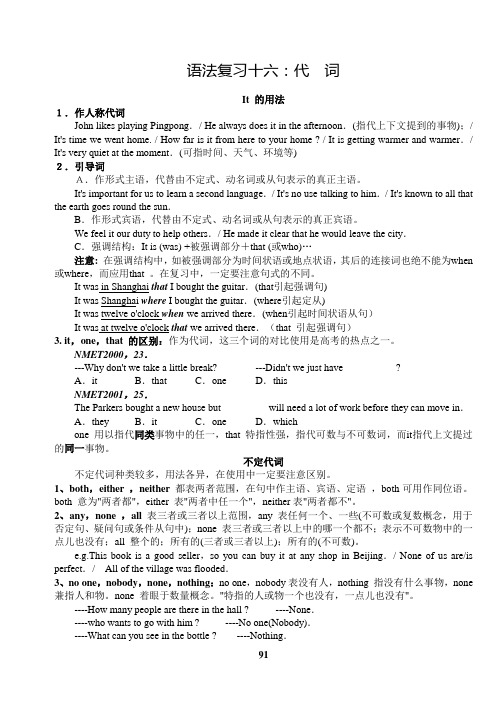
语法复习十六:代词It 的用法1.作人称代词John likes playing Pingpong./ He always does it in the afternoon.(指代上下文提到的事物);/ It's time we went home. / How far is it from here to your home ? / It is getting warmer and warmer./ It's very quiet at the moment.(可指时间、天气、环境等)2.引导词A.作形式主语,代替由不定式、动名词或从句表示的真正主语。
It's important for us to learn a second language./ It's no use talking to him./ It's known to all that the earth goes round the sun.B.作形式宾语,代替由不定式、动名词或从句表示的真正宾语。
We feel it our duty to help others./ He made it clear that he would leave the city.C.强调结构:It is (was) +被强调部分+that (或who)…注意:在强调结构中,如被强调部分为时间状语或地点状语,其后的连接词也绝不能为when 或where,而应用that 。
在复习中,一定要注意句式的不同。
It was in Shanghai that I bought the guitar.(that引起强调句)It was Shanghai where I bought the guitar.(where引起定从)It was twelve o'clock when we arrived there.(when引起时间状语从句)It was at twelve o'clock that we arrived there.(that 引起强调句)3.it,one,that 的区别:作为代词,这三个词的对比使用是高考的热点之一。
语法知识—代词的知识点
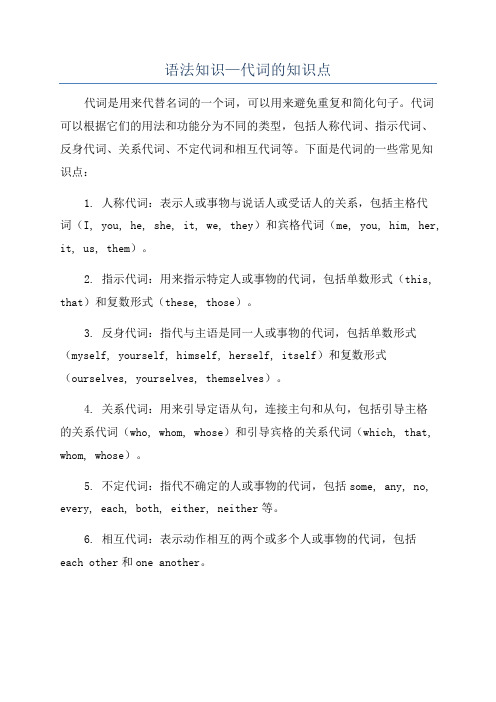
语法知识—代词的知识点
代词是用来代替名词的一个词,可以用来避免重复和简化句子。
代词
可以根据它们的用法和功能分为不同的类型,包括人称代词、指示代词、
反身代词、关系代词、不定代词和相互代词等。
下面是代词的一些常见知
识点:
1. 人称代词:表示人或事物与说话人或受话人的关系,包括主格代
词(I, you, he, she, it, we, they)和宾格代词(me, you, him, her, it, us, them)。
2. 指示代词:用来指示特定人或事物的代词,包括单数形式(this, that)和复数形式(these, those)。
3. 反身代词:指代与主语是同一人或事物的代词,包括单数形式(myself, yourself, himself, herself, itself)和复数形式(ourselves, yourselves, themselves)。
4. 关系代词:用来引导定语从句,连接主句和从句,包括引导主格
的关系代词(who, whom, whose)和引导宾格的关系代词(which, that, whom, whose)。
5. 不定代词:指代不确定的人或事物的代词,包括some, any, no, every, each, both, either, neither等。
6. 相互代词:表示动作相互的两个或多个人或事物的代词,包括
each other和one another。
除了以上常见的代词类型,还有其他一些代词的特殊用法和规则需注意。
在使用代词时,需要注意代词的数、格和性等与先行词保持一致。
同时,需要注意代词的位置和修饰词的选择,以确保句子的合理性和准确性。
人教英语中考语法专题--代词复习课件

第三人称
分 类
单 数 myself
yourself himself herself itself
复 ourselves yourselves 数
themselves
反身代词 反身代词练习 1
知识点
1、 Nowadays I can choose online courses and study by ____.
A.I
B.பைடு நூலகம்e
C.my
D.myself
【解析】本题考查代词辨析。句意为:现在,我可以选择网上课程,进行 自学。by oneself意为“独自地,单独”;study by oneself意为“自 学”。【答案】D
2.Girls, help __________ to some fruit, please.
语法专题-代词
知识点
重
难
点
点
教学目标
①人称代词 ②指示代词 ③物主代词 ④反身代词 ⑤疑问代词 ⑥不定代词
①人称代词主格和宾格 ②形容词性物主代词和名词性物主代词 ③反身代词 ④不定代词 ①名词性物主代词用法 ②不定代词用法及辨析
定义:代词是代替名词的一种词类, 按其意义、特征及其在句中的作用可 分为以下几类:
4.我们正在等他们。__W__e___ are waiting fort_h_e_m______.
5.是谁呀?是我。Who is there? It’s __m_e_______. 6.我和你、Tom,在音乐上有天赋。_______are talented in
1.You promised to write the article,and you must do_____A.
物主代词
《语法复习代词》课件

人称代词有第一人称、第二人称和第 三人称。
人称代词可以代替名词,也可以代替 动词,表示动作的执行者或承受者。
物主代词
物主代词是指表示所有关系的代词。
第一人称物主代词有“我的”、“我们的”,第 二人称物主代词有“你的”、“你们的”,第三 人称物主代词有“他的”、“她的”、“它的” 、“他们的”等。
物主代词有第一人称、第二人称和第三人称。
人称代词的指代
人称代词可以指代某个人或某个事物,例如“我喜欢他”中的“他” 指代某个特定的人。
人称代词的性别和数量
人称代词有单数和复数形式,单数有“我”、“你”、“他”、“她 ”,复数有“我们”、“你们”、“他们”。
人称代词的格
人称代词有主格和宾格之分,主格用于作主语,宾格用于作宾语。
物主代词的用法
代词在句子中的位置还可以位于句末,作为宾语或补语出现。例如,“我们看 到了他”中,“他”是代词,作为宾语出现在句末。
指示代词的用法
指示代词的基本用法
指示代词的复数形式
指示代词用来指代某个或某些特定的 人或事物,如“这个”、“那个”、 “这些”、“那些”等。
指示代词也有单数和复数形式,单数 有“这个”、“那个”,复数有“这 些”、“那些”。
指示代词的近指和远指
指示代词可以表示近指,如“这个苹 果”指的是眼前的苹果;也可以表示 远指,如“那个苹果”指的是远离说 话人的苹果。
《语法复习代词》ppt 课件
目录 CONTENT
• 代词的种类 • 代词的用法 • 代词的特殊用法 • 代词与其他词类的关系 • 代词在句子中的位置
01
代词的种类
人称代词
人称代词是指代替人或事物名称的代 词。
第一人称代词有“我”、“我们”, 第二人称代词有“你”、“你们”, 第三人称代词有“他”、“她”、“ 它”、“他们”等。
中文代词知识点总结

中文代词知识点总结一、代词的基本概念代词是用来代替名词或其他代词的词语,它可以在句子中起到替代作用。
代词一般可以替代名词,从而避免重复,简化表达。
例如,“他”可以代替“张三”,“它”可以代替“这本书”。
代词在句子中的作用和位置类似于名词,可以作为主语、宾语、定语、状语等。
代词的种类很多,按照不同的分类标准可以分为人称代词、物主代词、指示代词、疑问代词、不定代词等。
二、人称代词人称代词是用来表示说话人、听话人、以及与说话人和听话人所说的人或事物之间的人称关系的代词。
在汉语中,人称代词有“我、你、他(她、它)、我们、你们、他们”等。
人称代词的用法有以下几点需要注意:1. 人称代词可以用作主语、宾语、定语、状语等。
例如,“我喜欢唱歌。
”中的“我”是主语,“你看到了我吗?”中的“我”是宾语。
2. 人称代词有单数和复数之分,单数形式用于表示一个人或事物,复数形式用于表示多个人或事物。
例如,“他很高。
”是说一个人,“他们很高。
”是说多个人。
3. 人称代词的使用需要根据具体的语境和情境来确定。
例如,在不同的交际场合中,我们可能会选择不同的人称代词来表达不同的语义关系。
三、物主代词物主代词是用来表示所有关系的代词,包括表示所有关系的人称代词和非人称代词。
在汉语中,物主代词有“我的、你的、他的(她的、它的)、我们的、你们的、他们的”等。
物主代词的用法有以下几点需要注意:1. 物主代词可以用作形容词性物主代词和名词性物主代词。
形容词性物主代词一般修饰名词,名词性物主代词一般代替名词。
例如,“我的书”中的“我的”是形容词性物主代词,“这本书是我的。
”中的“我的”是名词性物主代词。
2. 物主代词有单数和复数之分,单数形式用于表示一个人或事物,复数形式用于表示多个人或事物。
例如,“我的手机”是单数,“我们的手机”是复数。
3. 物主代词的使用也需要根据具体的语境和情境来确定,具体要看所指代的人或事物是属于谁的。
四、指示代词指示代词是用来表示离说话者近或说话者远、靠近或远离听话者近或听话者远、与说话者和听话者或与所说的人或事物之间的关系。
专项复习讲义小升初专项复习代词
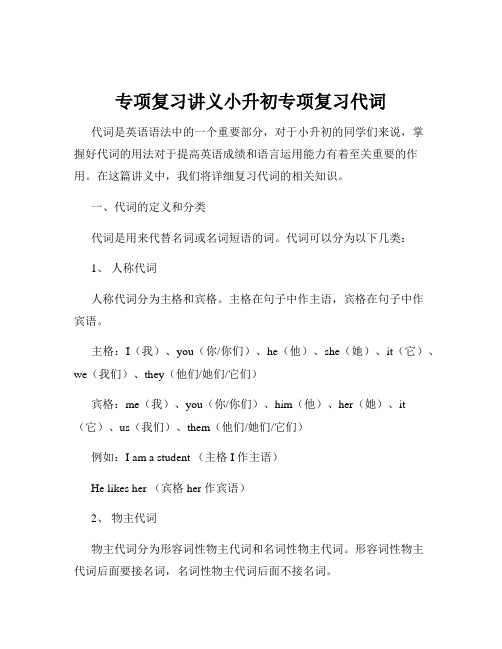
专项复习讲义小升初专项复习代词代词是英语语法中的一个重要部分,对于小升初的同学们来说,掌握好代词的用法对于提高英语成绩和语言运用能力有着至关重要的作用。
在这篇讲义中,我们将详细复习代词的相关知识。
一、代词的定义和分类代词是用来代替名词或名词短语的词。
代词可以分为以下几类:1、人称代词人称代词分为主格和宾格。
主格在句子中作主语,宾格在句子中作宾语。
主格:I(我)、you(你/你们)、he(他)、she(她)、it(它)、we(我们)、they(他们/她们/它们)宾格:me(我)、you(你/你们)、him(他)、her(她)、it (它)、us(我们)、them(他们/她们/它们)例如:I am a student (主格 I 作主语)He likes her (宾格 her 作宾语)2、物主代词物主代词分为形容词性物主代词和名词性物主代词。
形容词性物主代词后面要接名词,名词性物主代词后面不接名词。
形容词性物主代词:my(我的)、your(你的/你们的)、his(他的)、her(她的)、its(它的)、our(我们的)、their(他们的/她们的/它们的)名词性物主代词:mine(我的)、yours(你的/你们的)、his(他的)、hers(她的)、its(它的)、ours(我们的)、theirs(他们的/她们的/它们的)例如:This is my book (形容词性物主代词 my 后接名词 book)The book is mine (名词性物主代词 mine 单独使用)3、指示代词指示代词有 this(这个)、that(那个)、these(这些)、those (那些)。
例如:This is a pen (this 指近处的单个物品)Those are apples (those 指远处的多个物品)4、不定代词不定代词有 some(一些)、any(一些/任何)、many(许多)、much(许多)、few(很少)、a few(一些)、little(很少)、a little (一点)、all(全部)、both(两者都)、either(两者中的任何一个)、neither(两者都不)、none(三者或三者以上都不)等。
中考英语语法考点精练(浓缩版)16开
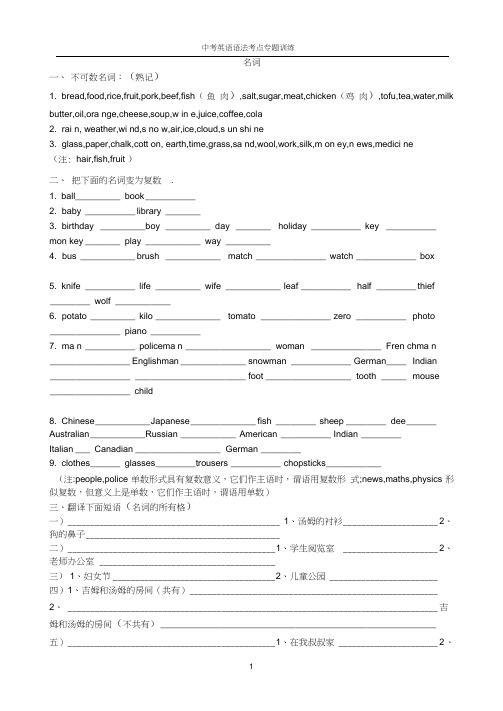
名词一、不可数名词:(熟记)1. bread,food,rice,fruit,pork,beef,fish(鱼肉),salt,sugar,meat,chicken(鸡肉),tofu,tea,water,milk butter,oil,ora nge,cheese,soup,w in e,juice,coffee,cola2. rai n, weather,wi nd,s no w,air,ice,cloud,s un shi ne3. glass,paper,chalk,cott on, earth,time,grass,sa nd,wool,work,silk,m on ey,n ews,medici ne(注: hair,fish,fruit )二、把下面的名词变为复数.1. ball_________ book __________2. baby __________ library _______3. birthday _________boy _________ day _______ holiday __________ key __________ mon key _______ play ___________ way _________4. bus ___________ brush ___________ match ______________ watch ____________ box5. knife __________ life _________ wife ___________ leaf __________ half ________ thief________ wolf ___________6. potato _________ kilo _____________ tomato ______________ zero __________ photo______________ piano __________7. ma n __________ policema n _________________ woman ______________ Fren chma n________________ Englishman _____________ snowman ____________ German____ Indian________________ ______________________ foot _________________ tooth _____ mouse________________ child8. Chinese ___________ J apanese _____________ fish ________ sheep ________ dee ______ Australian ___________Russian ___________ American __________ Indian ________Italian ___ Canadian _________________ German ________9. clothes ______ glasses ________ t rousers __________ chopsticks ___________(注:people,police单数形式具有复数意义,它们作主语时,谓语用复数形式;news,maths,physics形似复数,但意义上是单数,它们作主语时,谓语用单数)三、翻译下面短语(名词的所有格)一)_______________________________________________ 1、汤姆的衬衫_____________________ 2、狗的鼻子___________________________________________二)______________________________________________ 1、学生阅览室 _____________________ 2、老师办公室_______________________________________三) 1、妇女节____________________________________ 2、儿童公园 ________________________ 四)1、吉姆和汤姆的房间(共有)_______________________________________________________ 2、 __________________________________________________________________________________ 吉姆和汤姆的房间(不共有) _______________________________________________________ 五)______________________________________________ 1、在我叔叔家 ______________________ 2、去医务室__________________________________________3、去理发店___________________________________4、去陈家 ____________________________ 六)____________________________________________ 1、日本的首都 ________________________ 2、公民公园的门口_________________________________3、这棵树的叶子______________________________________________________________________ (注:指时间、距离、地点的无生命的名词也可加's表示所有格。
中学语法大全代词
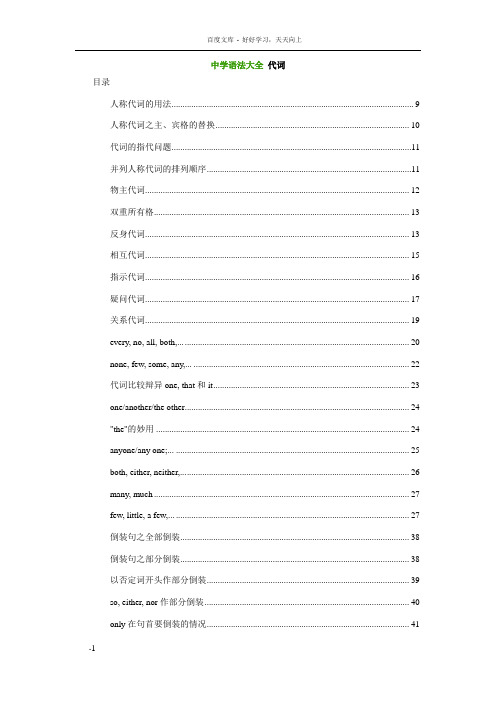
中学语法大全代词目录人称代词的用法 (9)人称代词之主、宾格的替换 (10)代词的指代问题 (11)并列人称代词的排列顺序 (11)物主代词 (12)双重所有格 (13)反身代词 (13)相互代词 (15)指示代词 (16)疑问代词 (17)关系代词 (19)every, no, all, both,... (20)none, few, some, any,... .. (22)代词比较辩异one, that和it (23)one/another/the other (24)"the"的妙用 (24)anyone/any one;... . (25)both, either, neither,... .. (26)many, much (27)few, little, a few,... . (27)倒装句之全部倒装 (38)倒装句之部分倒装 (38)以否定词开头作部分倒装 (39)so, either, nor作部分倒装 (40)only在句首要倒装的情况 (41)as, though引导的倒装句 (41)其他部分倒装 (41)定语从句 (52)关系代词引导的定语从句 (52)关系副词引导的定语从句 (53)判断关系代词与关系副词 (53)限制性和非限制性定语从句 (55)介词+关系词 (56)as, which非限定性定语从句 (56)先行词和关系词二合一 (57)what/whatever/that... (58)关系代词that的用法 (58)不定式作宾语 (67)不定式作补语 (69)不定式主语 (71)It's for sb/It's of sb (72)不定式作表语 (72)不定式作定语 (72)不定式作状语 (73)用作介词的to (73)省to 的动词不定式 (74)动词不定式的否定式 (75)不定式特殊句型too...to. (76)不定式特殊句型so as to (77)不定式特殊句型Why not (77)不定式的时态和语态 (77)动名词与不定式 (78)系动词 (89)什么是助动词 (91)助动词be的用法 (92)助动词have的用法 (93)助动词do 的用法 (93)助动词shall和will的用法 (94)助动词should, would的用法 (95)短语动词 (95)非谓语动词 (96)一般现在时的用法 (106)一般过去时的用法 (106)used to/be used to (108)一般将来时 (108)be going to/will (109)be to和be going to (110)一般现在时表将来 (110)用现在进行时表示将来 (110)现在完成时 (111)比较过去时与现在完成时 (111)用于现在完成时的句型 (113)比较since和for (114)since的四种用法 (115)延续动词与瞬间动词 (115)过去完成时 (116)用一般过去时代替完成时 (117)将来完成时 (118)不用进行时的动词 (119)过去进行时 (120)将来进行时 (121)一般现在时代替将来时 (121)一般现在时代替过去时 (122)一般现在时代替完成时 (122)一般现在时代替进行时 (122)现在进行时代替将来时 (123)时态一致 (123)时态与时间状语 (123)动词的语态 (133)let 的用法 (133)短语动词的被动语态 (134)表示"据说"或"相信"的词组 (134)不用被动语态的情况 (134)主动形式表示被动意义 (136)被动形式表示主动意义 (137)need/want/require/worth (137)动名词作主语、宾语和表语 (147)worth 的用法 (148)独立主格 (158)With的复合结构 (159)分词作定语 (170)分词作状语 (171)连词+分词(短语) (172)分词作补语 (172)分词作插入语 (173)分词的时态 (173)分词的语态 (174)不定冠词的用法 (184)定冠词的用法 (184)零冠词的用法 (186)冠词与形容词+名词结构 (187)冠词位置 (187)数词 (188)句子的种类 (198)祈使句 (200)感叹句结构 (201)强调句结构 (203)用助动词进行强调 (204)反意疑问句 (204)连词 (217)并列连词与并列结构 (218)比较and和or (219)表示选择的并列结构 (220)表示转折或对比 (220)表原因关系 (221)比较so和such (221)名词概论 (231)其它名词复数的规则变化 (232)名词复数的不规则变化 (233)不可数名词量的表示 (234)定语名词的复数 (235)不同国家的人的单复数 (236)名词的格 (237)名词性从句 (247)引导名词性从句的连接词 (247)名词性that-从句 (248)名词性wh-从句 (249)if, whether引导的名词从句 (250)否定转移 (251)情态动词的语法特征 (261)比较can 和be able to (261)比较may和might (262)比较have to和must (263)must表示推测 (263)表示推测的用法 (264)情态动词+have+过去分词 (265)should和ought to (266)had better表示最好 (266)would rather表示"宁愿" (267)will和would (267)情态动词的回答方式 (268)带to的情态动词 (269)比较need和dare (270)stop doing/to do (279)forget doing/to do (280)remember doing/to do (280)regret doing/to do (281)try doing/to do (282)go on doing/to do (282)be afraid doing/to do (282)be interested doing/... (283)mean doing/to do (283)begin(start) doing/to do (283)感官动词+ doing/to do (284)形容词及其用法 (293)以-ly结尾的形容词 (294)用形容词表示类别和整体 (294)多个形容词修饰名词的顺序 (295)副词及其基本用法 (296)兼有两种形式的副词 (297)形容词与副词的比较级 (298)as+形容词或副词原级+as (300)比较级形容词或副词+than (300)可修饰比较级的词 (301)many, old和far (302)the+最高级+比较范围 (303)和more有关的词组 (304)虚拟语气 (313)真实条件句 (314)非真实条件句 (315)混合条件句 (316)虚拟条件句的倒装 (316)特殊的虚拟语气词:should (317)比较if only与only if (319)It is (high) time that (319)need"不必做"和"本不该做" (320)主谓一致 (329)并列结构作主语谓语用复数 (330)主谓一致中的靠近原则 (330)谓语动词与前面的主语一致 (331)谓语需用单数 (331)指代意义决定谓语的单复数 (332)与后接名词或代词保持一致 (332)地点状语从句 (342)方式状语从句 (342)原因状语从句 (344)目的状语从句 (344)结果状语从句 (344)条件状语从句 (345)让步状语从句 (346)比较while, when, as (348)比较until和till (348)表示"一...就..."的结构 . (349)人称代词的用法1)人称代词的主格在句子中作主语或主语补语,例如:John waited a while but eventually he went home.约翰等了一会儿,最后他回家了。
- 1、下载文档前请自行甄别文档内容的完整性,平台不提供额外的编辑、内容补充、找答案等附加服务。
- 2、"仅部分预览"的文档,不可在线预览部分如存在完整性等问题,可反馈申请退款(可完整预览的文档不适用该条件!)。
- 3、如文档侵犯您的权益,请联系客服反馈,我们会尽快为您处理(人工客服工作时间:9:00-18:30)。
语法复习十六:代词It 的用法1.作人称代词John likes playing Pingpong./ He always does it in the afternoon.(指代上下文提到的事物);/ It's time we went home. / How far is it from here to your home ? / It is getting warmer and warmer./ It's very quiet at the moment.(可指时间、天气、环境等)2.引导词A.作形式主语,代替由不定式、动名词或从句表示的真正主语。
It's important for us to learn a second language./ It's no use talking to him./ It's known to all that the earth goes round the sun.B.作形式宾语,代替由不定式、动名词或从句表示的真正宾语。
We feel it our duty to help others./ He made it clear that he would leave the city.C.强调结构:It is (was) +被强调部分+that (或who)…注意:在强调结构中,如被强调部分为时间状语或地点状语,其后的连接词也绝不能为when 或where,而应用that 。
在复习中,一定要注意句式的不同。
It was in Shanghai that I bought the guitar.(that引起强调句)It was Shanghai where I bought the guitar.(where引起定从)It was twelve o'clock when we arrived there.(when引起时间状语从句)It was at twelve o'clock that we arrived there.(that 引起强调句)3.it,one,that 的区别:作为代词,这三个词的对比使用是高考的热点之一。
NMET2000,23.---Why don't we take a little break? ---Didn't we just have __________?A.it B.that C.one D.thisNMET2001,25.The Parkers bought a new house but _________will need a lot of work before they can move in.A.they B.it C.one D.whichone 用以指代同类事物中的任一,that 特指性强,指代可数与不可数词,而it指代上文提过的同一事物。
不定代词不定代词种类较多,用法各异,在使用中一定要注意区别。
1、both,either ,neither都表两者范围,在句中作主语、宾语、定语,both可用作同位语。
both 意为"两者都",either 表"两者中任一个",neither表"两者都不"。
2、any,none ,all表三者或三者以上范围,any 表任何一个、一些(不可数或复数概念,用于否定句、疑问句或条件从句中);none 表三者或三者以上中的哪一个都不;表示不可数物中的一点儿也没有;all 整个的;所有的(三者或三者以上);所有的(不可数)。
e.g.This book is a good seller,so you can buy it at any shop in Beijing./ None of us are/is perfect./ All of the village was flooded.3、no one,nobody,none,nothing:no one,nobody表没有人,nothing 指没有什么事物,none 兼指人和物。
none 着眼于数量概念。
"特指的人或物一个也没有,一点儿也没有"。
----How many people are there in the hall ? ----None.----who wants to go with him ? ----No one(Nobody).----What can you see in the bottle ?----Nothing.----Is there any water in it ?----None.4、another,the other,the other+复数名词(或the others),other (或other +复数名词):another 表三者或三者以上范畴中的任一;与数词连用,表"再有";the other 表两者中的另外那个,特指;the other+复数名词(或the others),另外那些,表示其余所有的人或物,用于特指;others (或other+复数名词)另一些,表余下人或物中的另一些,泛指。
---I don't like this,show me another one.(NMET 2000,16)If you want to change for a double room you'll have to pay_______$15.A.another B.other C.more D.Each (A)人称、物主、反身、指示代词高考重点要求1.掌握人称代词、物主代词、疑问代词、反身代词、指示代词的基本用法。
2.重点掌握不定代词的指代含义及数的情况,能通过语境准确选取答案。
3.掌握it的基本用法。
一.人称代词1)分清主格和宾格形式。
eg:---I love you more than her,child ./ ---You mean more than ___love her or more than she loves____? A.you;me B.I;you C.you;you D.I;me2)注意约定俗成的用法。
---Who is it ? ---It's me .---I'd like to have a rest .---Me,too.3)使用we 和you 泛指一般人4)使用she代表国家、船只、月亮、大地等China is a great country.She has a long history.5)并列主语或宾语中顺序是:you,he(she) and I;we,you and they二.物主代词:名词性物主代词――在句中做主语、宾语、表语、补足语,构成双重所有格:a friend of mine 。
形容词性物主代词――只能起定语作用。
三.反身代词1) 在句中作宾语、表语和同位语;2)单复数的确定;3)在一些语境中的特殊含义。
e.g. I'm not quite myself today.我今天不大舒服。
/ Make yourself at home.不要拘礼;请随便吧。
/ Don't get nervous,help yourself to what you like.别紧张,喜欢吃什么就吃什么。
/ Have you enjoyed yourself today? 你今天玩得愉快吗?四.指示代词(一)this,that,these those1.在句子中作主语、宾语、表语和定语。
2.this(these)一般指时间和空间上较近的人或物,而that (those)常指时间和空间上较远的人或物。
e.g. This is a novel and that is a magazine.3.this(these)一般指后面要讲到的事物,而that(those)常指前面讲到的事物。
e.g. What he told me is this:he wanted to go to Beijing./ He didn't come.That is why he didn't know.4.that,those 常用来指代前面提到过的某个名词。
e.g. The oil output in 1998 was higher than that of 1995.( that 代替oil output) / The cars made in Japan are better than those in Germany.(二)suchsuch引起倒装句,谓语数取决于后面主语的数:e.g Such is my answer./ Such are our people.做定语,注意和so 的区别,尤其是在so …that,such…that 句型中。
e.g. I have never seen such beautiful flowers.(复数名词前,so 不可) / I have never seen such a great film.(也可为so greata film) / We have such beautiful weather today that we should go out for an outing.(不可数词前,不可用so) / There are so many people in the hall that it's hard for me to find him.(在数量概念的many,much,little,few 之前,不可用such )练习(一)、代词一、强化训练:1. New English-Chinese Dictionary has been republished several times,_____ more up to date than the last edition.A. anyB. everyoneC. eitherD. each2. After paying 1,000 dollars_____ ,you'll all become full members of our club.A. eachB. allC. everyD. both3._____ was her cruelty that we all hated her.A. ItB. WhatC. ThatD. Such4. Mary has been ill in bed for a week. I wonder if she is _____ better now.A. muchB. someC. anyD. very5. -Which of these two ties will you take? -I don't like these. Do you have any_____ ?A. oneB. otherC. onesD. others6. I' d rather ride a bike as bike riding has _____ of the trouble of taking buses.A. muchB. allC. neitherD. none7. I need some blue ink today but there is _____ at hand.A. notB. nothingC. a littleD. none8. I found the very watch of mine _____ I had left _____ .A. where, itB. that, itC. which, oneD. where, o ne9. I haven't got time to get the tickets. Who's going to ____?A. do soB. do itC. buy itD. do them10. -Jack certainly has a high opinion of Susan. It can't be better than _____of him.A. hersB. sheC. thatD. her11. -Shall we introduce ____ fire-fighting equipment from abroad? -Go ahead, if necessary.A. otherB. a few moreC. anotherD. some other12. -How about the price of these refrigerators? -They are equal in price to, if not cheaper than,_____ at the other stores.A. othersB. itC. thatD. the ones13. -I dislike _____ when others laugh at me in public or speak ill of me behind. -So do I.A. themB. thoseC. itD. that14. -Which do you prefer, classical music or pop music? -_____. I prefer folk music.A. EitherB. BothC. NoneD. Neither15. Why don' t you trust and use old Tom? He is still as strong as _____ in the team.A. nobodyB. anybody elseC. everybodyD. somebody else16. -Are the new methods taking any effect? -Yes,_____ articles are stolen from our supermarket.A. fewB. moreC. someD. none17. During the meeting a young man cried out suddenly and threw his notebook at the chairman,_____ brought the room to disorder.A. itB. and whichC. and thatD. this18. I've just seen no more than one copy of Gone with the Wind in the bookshop opposite. Tom, go andbuy_____ back.A. oneB. anyC. itD. some19. -Do you have _____ at home now? -No, we still have to get scores of eggs and some vegetables.A. nothingB. everythingC. anythingD. something20. Nancy is expecting another baby and hopes _____ will be a boy.A. heB. thatC. itD. there21. Surely it's _____ with the big nose you mean, not ____!A. he, IB. him, meC. him, ID. he, me22. The temperature can fall to –30℃. _____ is,30°C below freezing point.A. WhichB. ItC. ThatD. This23. -The exam was easy, wasn't it? -Yes, but I don' t think _____ could pass it.A. somebodyB. everybodyC. anybodyD. nobody24. Cut the apple into halves so that the twins may each get _____ half.A. everyB. eachC. anotherD. either25. _____ of us can do everything, but all of us can do _____ .A. None, somethingB. Some, everythingC. Few, somethingD. Few, nothing26. -May I help you with some gloves, sir? -Yes, I'd like to try those blue ____.A. oneB. onesC. pairD. two27. Of all my friends _____ will be able to persuade Tom to change his mind. He is so firm upon it.A. noneB. nobodyC. neitherD. no one28. -Is he content to accept our offered price?-Yes. He cares more about the quality. Money is _____ to him.A. everythingB. anythingC. nothingD. something29. I have no idea which was better, so I took ____ of them.A. bothB. noneC. allD. any30. You mustn't always do _____ as he asks you to do. He may be wrong sometimes.A. anythingB. somethingC. nothingD. everything31. I'm no painter, and to me, one painting is much like .A. anotherB. the otherC. othersD. one32. I didn't want either of ____ hats and asked the salesman to show me_____.A. those, anotherB. two, the otherC. all, the othersD. both, others33. The children were catching butterflies in the garden. Some caught a lot, and others caught _ at all.A. nothingB. noneC. no oneD. neither34. Thank you very much indeed. That' s _____ of you.A. kindestB. most kindC. the kinderD. the most kind35. Jack is a very likable fellow, but I've learned to take _____ he says with a grain of salt.A. somethingB. anythingC. nothingD. everything36. -I love you more than her, child. -You mean more than ____ love her or more than she loves ____?A. you, meB. I, youC. you, youD. I, me练习(二)、代词二、高考题选:1. Was it during the Second World War _____he died? (MET88)A.that B. while C. in which D. then2. Is _____necessary to take off our shoes when we enter the lab? (MET88H)A.everyone B. this C. her D. it3.Is _____possible to fly to the moon in a spaceship? (MET88)A.now B. that C. it D. man4.His Parents wouldn't let him marry anyone _____family was poor.(MET88)A.of whom B. whom C. of whose D. whose5._____leaves the room last ought to turn off the light.(MET88)A.Anyone B. The person C. Whoever D. Who6._____writer is better known in China,Charcles Dickens or Mark Twain? (MET88) A.Which B. What C. Either D. Whether7.---Have you seen Tom and Mary? ---I haven' t seen _____of them.(MET88) A.neither B. any C. either D. all8.Is _____necessary to complete the design before National Day? (MET89)A.this B. that C. it D. he9.All _____is needed is a supply of oil.(MET89)A.the thing B. that C. what D. which10.His camera is more expensive than ______.(MET89)A.hers B. her C. it D. its11.I don't think _____possible to master a foreign language without much memory work.(MET90) A.this B. that C. its D. it12.______of them knew about the plan because it was kept in a secret.(MET90) A.Each B. Any C. No one D. None13.He paid the boy ¥10 for washing ten windows,most of _____hadn't been cleaned for at least a year.(MET90)A.these B. those C. that D. which14.Kate and her sister went to holiday with a cousin of _____.(MET90)A.their B. theirs C. her D. hers15.I invited Tom and Ann to dinner,but _____of them came.(NMET91)A.neither B. both C. either D. none16.She heard a terrible noise,_____brought her heart into her mouth.(MET91) A.it B. which C. this D. that17.We couldn't eat in a restaurant because _____of us had _____money on us.(MET91) A.all; no B. any; no C. none; any D. no one; any18.These plants are watered _____.(NMET91)A.each other day B. every other day C. each of two days D. every of two days 19.Alice received an invitation from her boss,_____came as a surprise.(NMET91) A.it B. that C. which D. he20.Does _____matter if he can't finish the job on time?A.this B. that C. he D. it21.Mr.Zhang gave the textbooks to all the pupils except _____who had already taken them.(MET92) A.the ones B. ones C. some D. the others22.There're so many kinds of tape-recorders on sale that I can't make up my mind _____to buy.(MET92)A.what B. which C. how D. where23.Although he's wealthy,he spends _____ on clothes.(NME792)A.little B. few C. a little D. a few24.In the dark street,there wasn't a single person _____ she could turn for help.(MET92) A.that B. who C. from whom D. to whom25._____he said at the meeting astonished everybody present.(MET93)A.What B. That C. The fact D. The matter26.---Would you like some wine? ---Yes,just _____.(MET93)A.little B.very little C.a little D.little bit27.Tom's mother kept telling him that he should work harder,but _____didn't help.(MET93) A.he B.which C.she D.it28.---Is _____here? ---No,Bob and Tim have asked for leave.(MET93) A.anybody B.somebody C.everybody D.nobody29.---Is your camera like Bill's and Ann's? ---No,but it's almost the same as _____.(NMET94) A.her B.yours C.them D.their30.The weather turned out to be very good,_____was more than we could expect.(NMET94) A.what B.which C.that D.it31._____is a fact that English is being accepted as an international language.(NMET95) A.There B.This C.That D.It32.They were very tired,but _____of them would stop to take a rest.(NMET95) A.any B.some C.none D.neither33.I hope there are enough glasses for each guest to have _____.(NMET95)A.it B.those C.them D.one34.---When shall we meet again? --Make it _____day you like; it's all the same to me.(NMET96) A.one B.any C.another D.some35.Tom felt that he knew everybody's business better than they knew it _____.(NMET96 ) A.themselves B.oneself C.itself D.himself36.I agree with most of what you said,but I don't agree with _____.(NMET97)A.everything B.anything C.something D.nothing37.Sarah has read lots of stories by American writers,Now she would like to read_____stories by writers from _____ countries.(NMET97)A.some; any B.other; some C.some; other D.other; other38.It was about 600 years ago _____ the first clock with a face and an hour hand was made.(NMET97) A.that B.until C.before D.when39.I hate _____when people talk with their mouths full.(NMET98)A.it B.that C.these D.them40.Dr.Black comes from either Oxford or Cambridge.I can't remember _____.(NMET98) A.where B.there C.which D.hat41.Why do you want a new job _____you've got such a good one already? (NMET98) A.that B.where C.which D.when42.It was only when I reread his poems recently _____I began to appreciate their beauty.(NMET98) A.until B.that C.then D.so43.Few pleasures can equal _____of a cool drink on a hot day.(NMET99)A.some B.any C.that D.those44.If you want to change for a double--room you'll have to pay _____$15.(NMET2000 ) A.another B.other C.more D.each45.---Why don't we take a little break? ---Didn't we just have _____? (NMET2000) A.it B.that C.one D.this46.It is the ability to do the job _____matters not where you come from or what you are.(NMET2000 ) A.one B.that C.what D.it47.If this dictionary is not yours,_____can it be? (NMET2001)A.what else B.who else C.which else's D.who else's48.Many people have helped with canned food,however,the food bank needs _____for the poor.(2001春招)A.more B.much C.many D.most49.The Parkers bought a new house but _____will need a lot of work before they can move in.(NMET2001)A.they B.it C.one D.which50.---He was nearly drowned once.(2002春招)---When was _____?---_____was in 1998 when he was in middle school.A. that; itB. this; thisC. this; itD. that; this。
